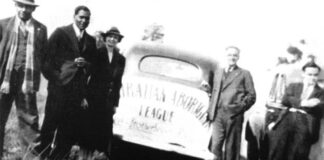On 3 March, Aboriginal people led demonstrations across Western NSW, demanding urgent action as rivers forming the Murray Darling system are killed by corporate greed. Communities there are facing an environmental and humanitarian crisis.
Rallies were organised by Local Aboriginal Land Councils (LALCs) at Bourke, Dareton, Dubbo, Menindee, Walgett and Wilcannia.
Michael Kennedy, Chairperson of the Wilcannia LALC explained to SBS that his Barkandji people take their name from the river, and are feeling extreme anguish as the source of their identity and livelihood is destroyed.
“This river means everything to us… when the river is sick like this, we are all sick. This river system must be put first before anything—greed, cotton, any sort of irrigation”. The Barkandji are threatening to blockade the Barrier Highway unless they see action.
Many of these communities have been protesting for years, watching the Barka (Darling) River drop to catastrophically low levels as huge cotton growing companies to their north have pumped it dry.
The recent kill of more than one million fish in the Menindee Lakes made national headlines, but for the roughly 1000 kilometres of dry river bed from Menindee to Bourke there are no fish at all.
Many communities are relying on bottled water, often trucked in by volunteers. The river water is non-existent or putrid, and bore water has dangerous levels of salt and minerals. Poor black families are hit hardest, unable to afford costs of up to $100 per week to buy bottled water.
Climate change has exacerbated this crisis, as communities swelter through record breaking temperatures, in overcrowded houses without consistent air conditioning.
The Wentworth Group of scientists released research in February showing that long before the drought water flows at key sites on the river were either unchanged or worse than before the Murray-Darling Basin plan was implemented in 2010. Much of the $13 billion allocated for the plan has instead fed corporate profits.
A central demand of the rally was for an end to trading in water. A market system currently sees rights allocated and traded between commercial interests. Aboriginal people have been cut out of this system entirely, despite having recognised Native Title rights which should extent to the river waters.
Any solution to the crisis must involve direct regulation. Agribusiness should be forced to release water, the cotton industry should be shut down and Aboriginal people given a central place in a new planning regime based on the needs of the river, its communities and the surrounding environment.
By Paddy Gibson





